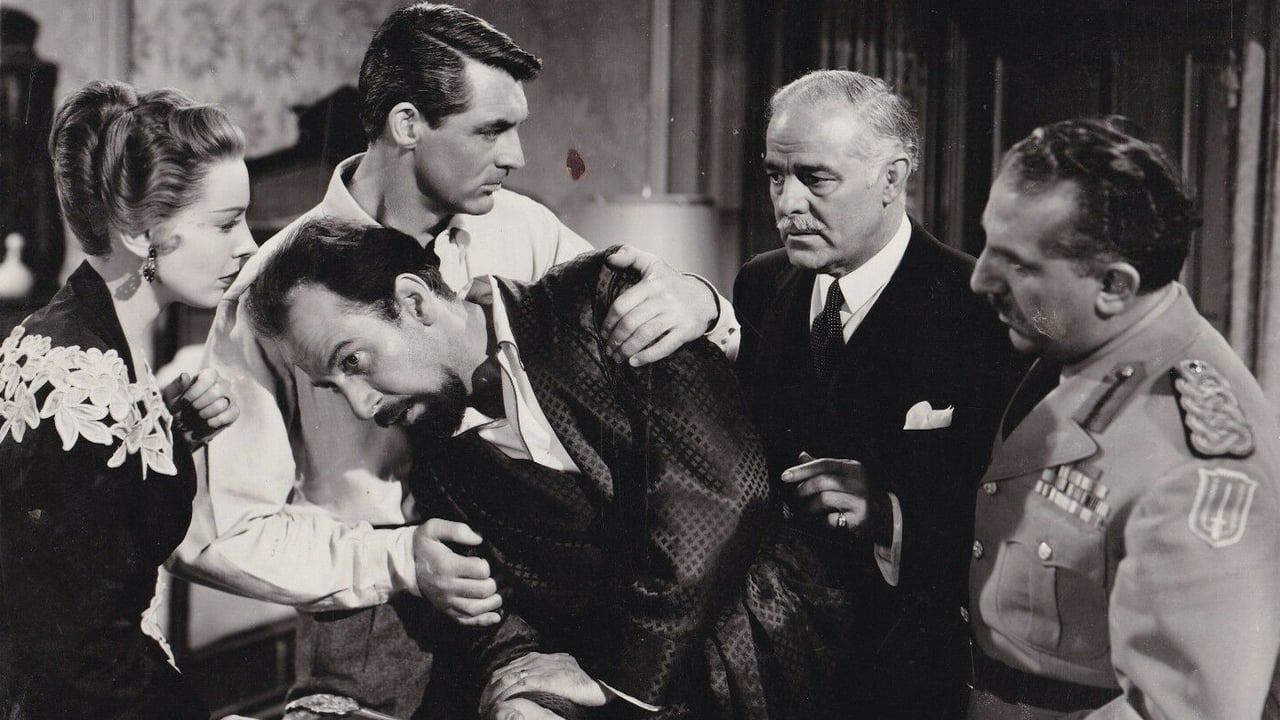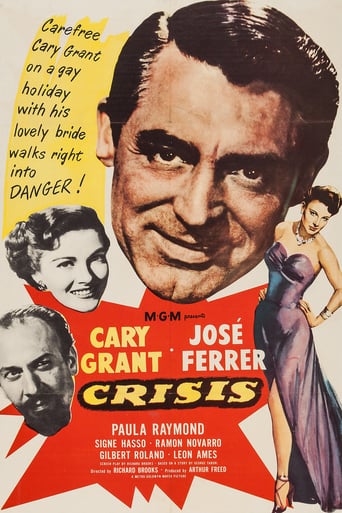



n my opinion it was a great movie with some interesting elements, even though having some plot holes and the ending probably was just too messy and crammed together, but still fun to watch and not your casual movie that is similar to all other ones.
View MoreIt's funny watching the elements come together in this complicated scam. On one hand, the set-up isn't quite as complex as it seems, but there's an easy sense of fun in every exchange.
View MoreThe film makes a home in your brain and the only cure is to see it again.
View MoreThere's a more than satisfactory amount of boom-boom in the movie's trim running time.
View MoreIt's always nice to discover a "new" Cary Grant movie. As I watched this one, I really liked it. As the movie begins, a renowned American neurosurgeon, Dr. Eugene Norland Ferguson (Cary Grant) and his wife, Helen (Paula Raymond) are on vacation in an unidentified Latin American country. When local civil violence breaks out at a jai alai game they are attending, they try to avoid it. However during the upheaval, they are kidnapped by the local police and taken to the mansion of the country's military dictator, Raoul Farrago (Jose Ferrer). Though they are welcomed and treated well by Raoul's wife (Signe Hasso), they are clearly captives of the government and become pawns of a civil war between the country's dictator and its rebels. Dr. Ferguson determines that Farrago has a brain tumor that needs to be removed. But, he has no surgical team or equipment with with to operate, and Farrago's entourage forbids him or his wife from leaving the mansion or moving Farrago to any hospital, for fear of the local rebels' wish to kill Farrago. Ferguson asks that his wife be moved to safety, and his wish is granted. But, the rebels soon grab her and demand that Ferguson let Farrago die or kill him on the operating table. However, as a physician, he cannot allow himself to be swayed by political upheaval, not even to save his wife's life. The movie continues to its conclusion, with tension in the operating room and tension on the streets of the Latin American capital.
View MoreCary Grant stars as a famous neurosurgeon who is vacationing in a South American country with his new bride. The pair are subject to a "friendly abduction" when the current president of that country, Raoul Farrago (Jose Ferrer), learns of his presence. You see, the president has a brain tumor, and due to the fact that his country is on the verge of civil war, he dares not travel to another country for the operation he needs to save his life.Farrago is a tyrant who claims that he must be so because democracy would never work in his country. His people are illiterate children, he says, and wouldn't know what to do with freedom if they had it. However, being a national "father image" doesn't prevent the president from stealing everything in the country that isn't nailed down. The president's wife does a great job of emulating Evita Peron before much was really known about her. Then there is Gilbert Roland as the leader of the opposition. He wants to make his people free, as long as he gets to be the new dictator. Roland does a great job with this role. How far he has progressed here since his early days as an actor at the dawn of sound.So the question is - does Grant owe a service to the dictator by saving his life with a delicate operation only so that patient can go on being a killer and a thief, or would the death of this tyrant better serve mankind? If you throw the safety of his wife into the balance - what decision does the doctor make?
View MoreWhile vacationing in South America, brain surgeon Cary Grant (as Eugene Ferguson) is railroaded into operating on his host country's despotic dictator, Jose Ferrer (as Raoul Farrago). El Presidente Ferrer has a brain tumor, and won't let Dr. Grant leave the country unless he agrees to operate. As a show of good faith, Ferrer grants pretty Mrs. Paula Raymond (as Helen), Grant's wife, permission to leave the country early, so she can go shopping. Things get complicated when Ms. Raymond is kidnapped en route, by revolution-minded Gilbert Roland (as Gonzales).This is most notable as the first film for director Richard Brooks, who went on to have a very impressive career. "Crisis" is a well-intentioned and thoughtful, but labored, political drama. Ferrer does well in his role; but, Grant's persona doesn't quite fit the scrub cap, surgical gown, and latex gloves. TCM's Bob Osborne reported that Mr. Brooks' original script gave Grant a 12-year-old daughter, but, MGM wanted Grant to have a romantic partner. Watch for former silent film stars, like Ramon Novarro (Col. Adragon) and Antonio Moreno (Dr. Nierra).***** Crisis (7/3/50) Richard Brooks ~ Cary Grant, Jose Ferrer, Paula Raymond, Ramon Novarro
View MoreI saw this film again last night after a very long time and could not help comparing it to the similarly themed British film 'State Secret', which was also released in 1950. Whereas State Secret was a fast moving classic full of snappy dialogue and dark wit, CRISIS let itself down by a plodding script, wooden acting and heavy moralising. Grant is unconvincing as the American surgeon caught up in political intrigue while vacationing with his wife in a South American country. The cinematography is poor, making the sequence of events hard to follow and the ending extremely melodramatic. Overall, it is a missed opportunity with such a good storyline to start with and I'd describe it as a badly made rather than a bad film.
View More